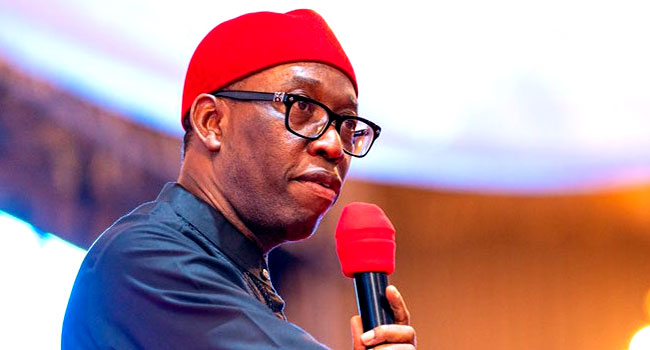Delta State Governor, Sen. Ifeanyi Okowa, has expressed optimism that President Muhammadu Buhari would sign the amended Electoral Bill into law.
Okowa noted that the president’s refusal to sign the Electoral Bill during his first term and before the 2019 general election was due to what he called ‘political considerations’.
The governor stated this on Friday at a town hall meeting with representatives of youth bodies in Delta North senatorial district, including organizers of the recent #EndSARS protest, students, community youth, and civil society groups.The President had declined assent to the 2018 Amendment to the Electoral Bill four times, saying he was concerned that passing a new electoral act could create uncertainty and interrupt or disrupt the 2019 general election, which was then close.
Buhari, who had earlier declined assent on the grounds that there were drafting issues and that he did not want anything that might usurp the constitutional powers of the Independent National Electoral Commission (INEC), expressed his position in a letter to the National Assembly in December 2018.
Read Also: Buhari Will Certainly Assent Electoral Act Amendment Bill – Malami
However, Okowa assured the people that the President would not, at this time, hold back his assent to the amendment to the Electoral Bill this time, which is intended to provide solutions to the numerous problems associated with elections in Nigeria, including compulsory use of card readers as well as fines and jail terms for officials, who are found guilty of omitting logos of parties from ballot papers.
‘I agree that there is a need to re-work our electoral processes, but we need to re-engineer our minds because we have lost it and it’s time we began to talk to ourselves.
‘The electoral amendment law wasn’t signed (by President Buhari) because of politics but I am sure it will be signed this time around; and so, as youths, you must get yourselves engaged so that we can get them closer into politics,’ he said.
The Delta governor also noted that the ongoing new wards creation process by the Delta State Independent Electoral Commission (DESIEC) was to correct certain imbalances in the system, saying by existing law, every local government area in the state should have a maximum of 20 wards.
For any election, he appealed to leaders to avoid the imposition of candidates but to build consensus or conduct free and fair primary elections for aspirants and to ensure that youths do not spend much to contest or participate in the processes.
While advising the youths he urged them to understand that politics was about learning along the line and they should always pick the good things they have seen in good politicians and discard the bad.
‘You must truly begin to organize yourselves in truth with a common goal and focus and whoever you select must stand for the common good of others.
‘We are building a new Nigeria with the youths and we must shun acts capable of reducing us when we leave the office. We will continue to allow youths, including females, to be part of the governance process because in learning you are building yourself for the future.
‘If you are a youth and you want to be active in politics you must respect your leaders and you must learn to pray a lot. I am encouraged to see many more youths go into politics and I hope it is for the right reasons. I know we have some youths representing their people but are they showing examples to others?
‘The act of leading requires deep thought, sincerity and leadership quality because there is a difference between an orator and the person who is able to lead,’ he concluded.
AFRICA TODAY NEWS, NEW YORK
